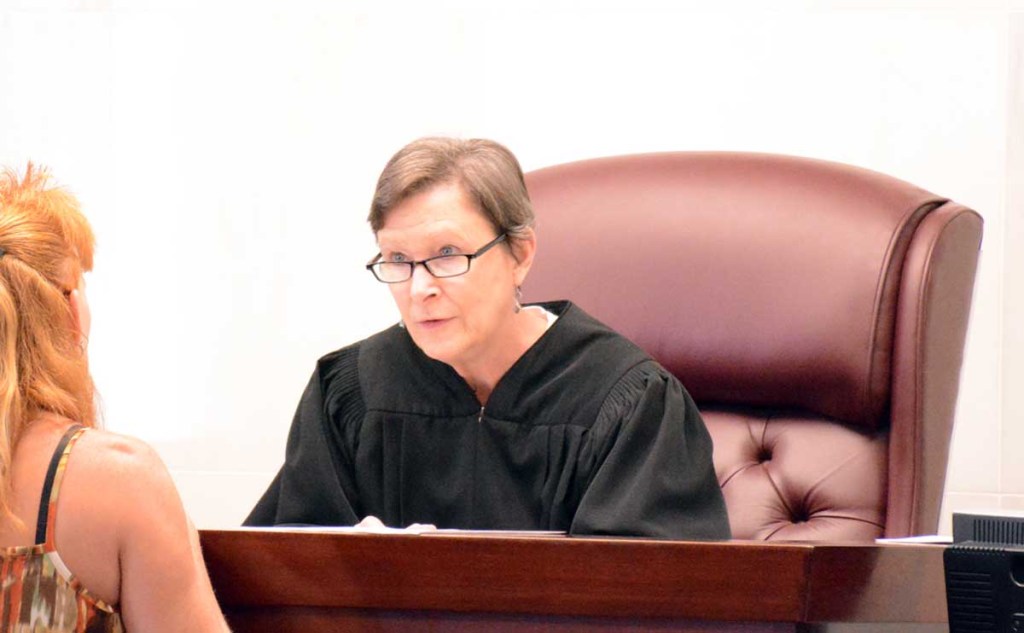Collecting what’s due: Cullman County court officials collect $30K in restitution, fines
Published 11:22 am Sunday, September 20, 2015

- Cullman County Circuit Court Judge Martha Williams talks with a defendant Friday, September 18, 2015 during an outstanding fines, restitution and court (FRAC) docket at the Cullman County Courthouse.
It was hard to get a seat, or a parking spot for that matter, at the Cullman County Courthouse Friday.
It was a packed house because hundreds were summoned to appear to pay outstanding fines, restitution and court (FRAC) costs due to victims and the court system. The proceeding is held quarterly in an effort to collect that owed money, and since its inception two years ago, more than $100,000 has been brought in, said Cullman County Circuit Clerk Lisa McSwain.
“This initiative was created primarily to assist our victims in receiving their court-ordered restitution, but it also helps the state recoup monies owed in court-ordered fines and costs,” she said. “The FRAC dockets are a tremendous asset in locating defendants and collecting outstanding monies. It allows all offices to work collectively and contact can be made with multiple defendants at one place.”
On Friday, Cullman County Circuit Court judges Greg Nicholas and Martha Williams and District Court Judge Rusty Turner presided over the proceedings that filled not only the courthouse’s largest courtroom but also a smaller secondary courtroom down the hall on the third floor. McSwain and her staff along with District Attorney Wilson Blaylock and his staff met with each person individually to get everyone back on the right financial track.
In all, around 250 people showed up to settle their debts, or in some cases, go to jail. A handful of individuals were held in contempt for failing to pay after signing agreements promising they would and left in handcuffs bound for the Cullman County Detention Center.
McSwain said defendants ordered to appear are at least 90 days delinquent with payments. Those who were served but didn’t show up Friday had a warrant issued for their arrest.
“We collected right around $10,000 from the docket today because a lot of people showed up and paid in full. They didn’t want to have to come to court again,” she said. “But in all, we collected around $30,000 from people who were served and paid before today’s docket.”
Since beginning in 2013, eight FRAC dockets have been held. The last setting on June 26 brought in approximately $23,000, McSwain said.
Blaylock said the dockets not only help the court system, and therefore taxpayers, but also crime victims — some who have gone years without being repaid.
“I know people have hard times and unexpected things come up. I understand that,” he said. “We’re just trying to collect and enforce what has already been ordered by the court. I thank the judges for participating and Lisa and her office for helping bring this docket along. Without everyone working together, it wouldn’t be possible.”
McSwain said officials continue to see long-term benefits when defendants are located and set up on regular payments.
“Defendants often owe on multiple cases. They tell us that these dockets have actually helped, because we set their cases up to be paid one after another,” she said. “They have a feeling of accomplishment when they can see a reduction in the amount owed and can pay their cases off one at a time.”
- The clerk’s office runs reports on cases more than 90 days delinquent, and the names are turned over to the district attorney’s Cost Recovery Unit. The DA’s office then attempts to locate the defendants. Once they are located, court officials assist them in getting caught up on payments through a signed agreement, garnishment or through an Income Withholding Order (IWO).
- Notices are sent out at least six weeks prior to the docket date by certified mail or through the sheriff’s office. A defendant’s information is researched each time a notice is returned due to insufficient address. Once a new address is obtained, a new notice is mailed out. McSwain said it’s not uncommon for up to four notices to be sent out for one person.
- Dockets are divided into five groups: current defendants who are caught up with payments, jail cases with defendants who are incarcerated, first call cases where it’s a defendant’s first docket appearance, review cases where defendants who were seen on a previous docket are required to return for review and contempt cases where defendants have been given the opportunity to pay and have failed to.





